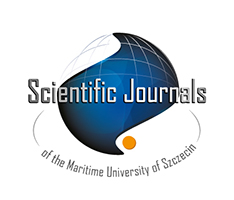Personal data of the authors, reviewers and members of the Scientific Board, subscribers and partners of the Scientific Journals of the Maritime University of Szczecin are protected according to the Regulation (EU) 2016/679 of the European Parliament and of the Council of 27 April 2016 on the protection of natural persons with regard to the processing of personal data and on the free movement of such data, and repealing Directive 95/46/EC (General Data Protection Regulation - GDPR).
Authors retain the copyright to their work, licensing it under the Creative Commons Attribution License Attribution 4.0 International licence (CC BY 4.0) which allows articles to be re-used and re-distributed without restriction, as long as the original work is correctly cited.
- paper relevance to the field of the journal;
- usefulness of the undertaken research for science and technology;
- paper originality and tackling current issues;
- content quality;
- research quality;
- appropriate terminology, methods, illustrations and references;
- preparing a paper for submission according to the instructions for authors.
The process of peer-review lies at the heart of scientific publishing. The editorial office of the Scientific Journals of the Maritime University of Szczecin protects the integrity of the paper quality with international standards on detecting plagiarism.
The SJ performs the following actions to prevent or detect plagiarism:
- using expertise of the Scientific Board members who are acknowledged international experts in their disciplines;
- proper selection of reviewers;
- providing open access to all published papers;
- indexing papers in internationally accessed databases;
- making public the information about sources of funding for the research presented in papers.
In the case of detecting plagiarism, the editorial office of the SJ takes appropriate actions to reveal scientific misconduct of authors, notifying the right authorities, employers and prosecution included.
A potential conflict of interest exists when an author, editor, publisher, reviewer or Scientific Board member has a personal or financial interest or belief that could influence his/her actions or affect objectivity.
The following are the most obvious examples of conflicts of interests:
- financial relationships - direct (employment, stock ownership, patents) and indirect (consultancies to sponsoring organizations, paid expert testimony), e.g. an author carried out research commissioned by the reviewer;
- personal relationships especially in academic competition or intellectual passion;
- personal beliefs that are in direct conflict with the topic of investigation.
In order to prevent scientific misconduct, the Editorial Board of the Scientific Journals of the Maritime University of Szczecin (Zeszyty Naukowe Akademii Morskiej w Szczecinie) introduced a procedure, consistent with the guidelines of the Polish Ministry of Science and Higher Education, protecting against "ghostwriting" and "guest authorship":
- If necessary Authors are required to submit their papers with a declaration of authorship specifying the contribution of individual authors (to concepts, principles, methods, etc. used in the paper) and their affiliations. The main responsibility lies with the author submitting the publication (the declaration template is available on the website of the Quarterly).
- If necessary Authors are required to provide information about funding sources and contribution of research institutions, associations and other entities to the publication.
- All detected cases of "ghostwriting" and "guest authorship" will be exposed, including notifying the appropriate entities (institutions employing the authors, scientific societies and associations, etc.).
- All detected cases of scientific misconduct are documented.
For "ghostwriting" we take the cases when someone has made a substantial contribution to a publication and thier participation as an author has not been revealed or when their role has not been described in the acknowledgments. "Guest authorship" ("honorary authorship") are situations when an author's contribution is insignificant, despite of the previous declaration.
News
Opłaty
Z dniem 09.03.2023 r. ulegają zmianie zasady finansowania publikacji artykułów w…
Editorial preface to issue 69(141)/2022
Dear Readers, as the year 2022 has come, people expect much and are looking to achieve…
Editorial preface to issue 68(140)/2021
Dear Readers, This is the last and fourth issue (No. 68) of our journal in 2021. This…
Payments
As of 01 January 2022, the rate for publishing a scientific paper in the Scientific…
News 3 12 2021
Based on the Communication of the Minister of Education and Science of December 1, 2021…
News 30 10 2021
For our journal, Scientific Journals of the Maritime University of Szczecin, 2021 is a…
